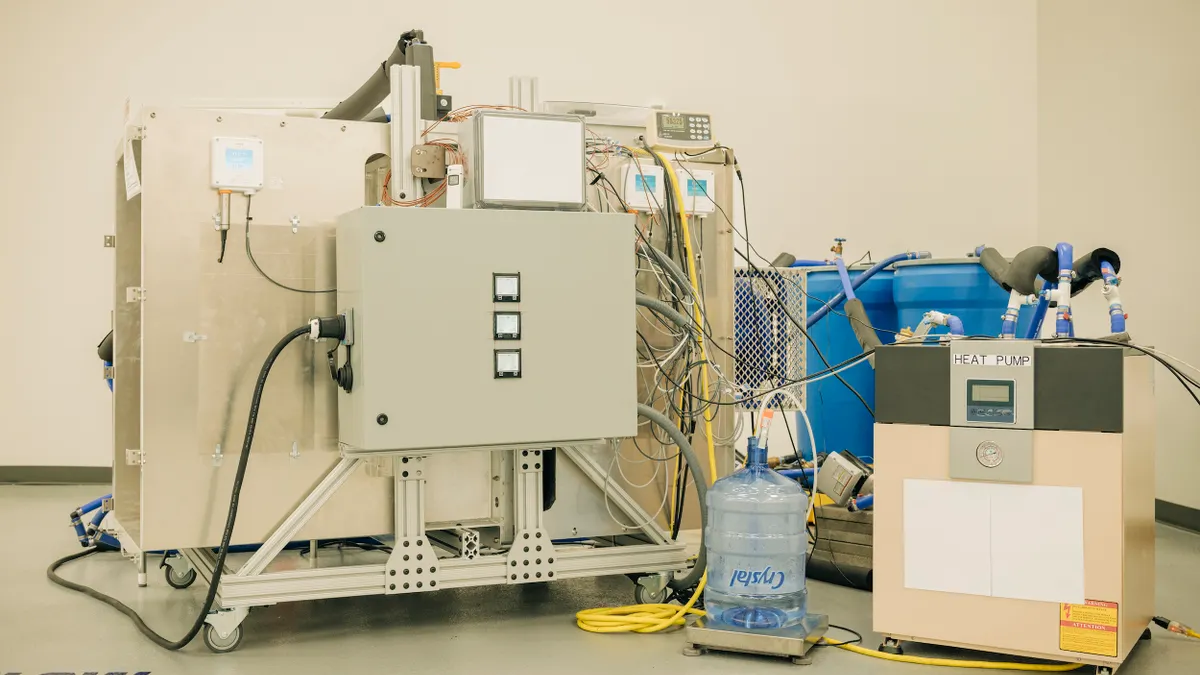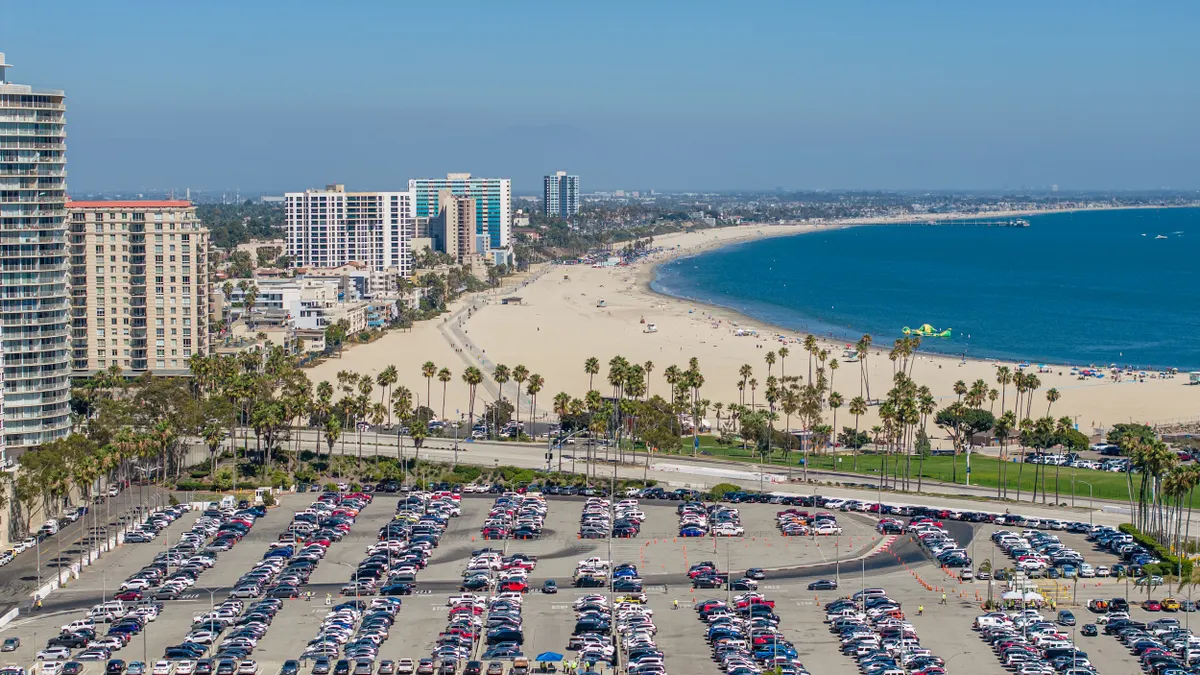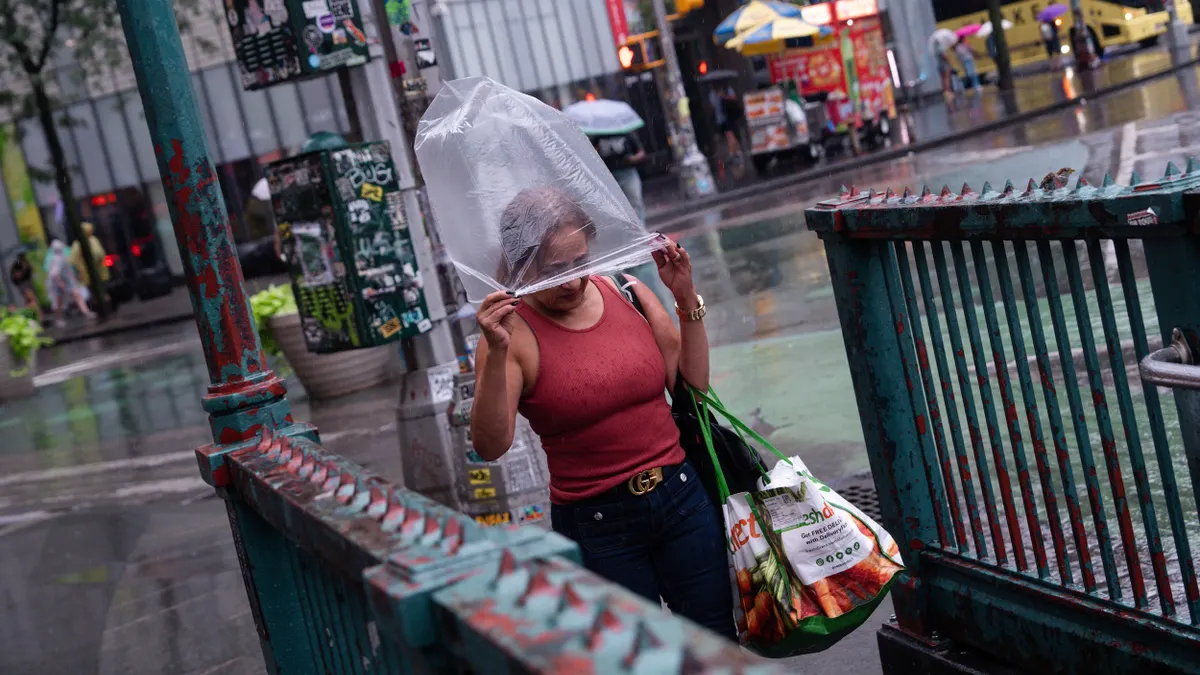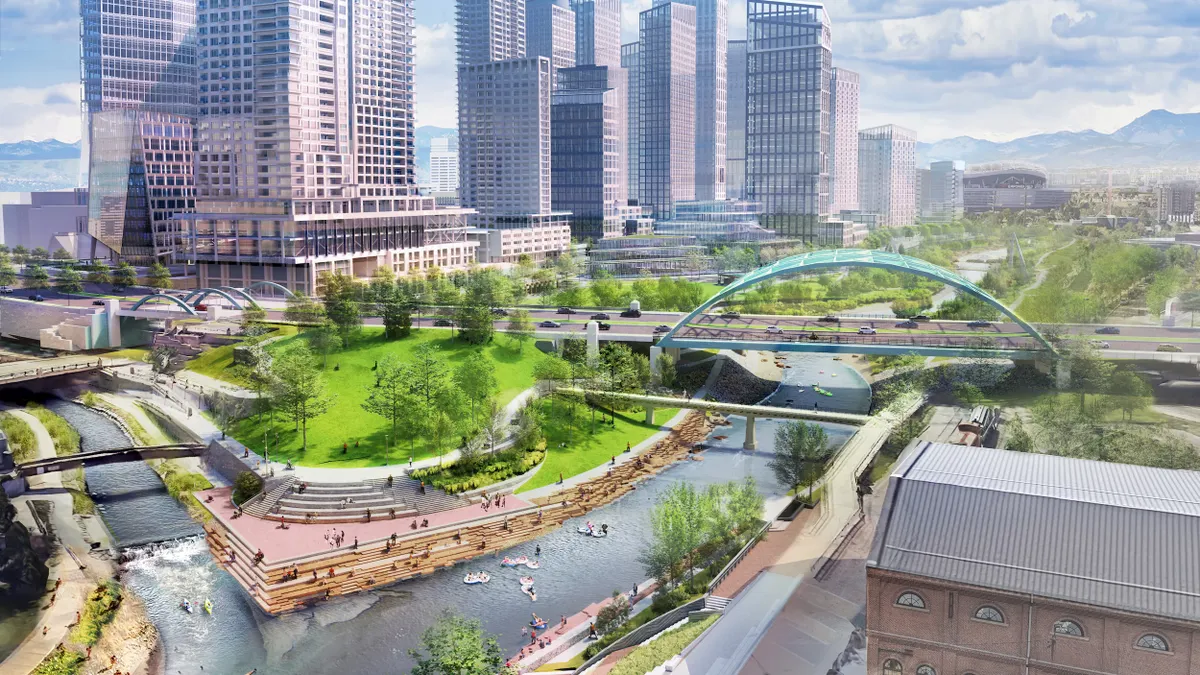As extreme weather and record temperatures have impacted cities around the world, government leaders and climate experts have attributed such events to "global warming" — but how warm is the globe really going to get?
This week, the United Nations-run Intergovernmental Panel on Climate Change (IPCC) is meeting to reach agreements over a key Summary for Policymakers that will outline how governments can limit the rise in global temperatures to a 1.5°C increase above pre-industrial levels. The summary is expected to be released next week, with a full report to be published by November.
While the summary should act as a helpful tool for global policymakers, the reality is that the earth is currently on a trajectory toward a 3-4°C temperature increase by 2100 — and that's just an average. Specific climate modeling projections, and how they will affect residents in various global cities, depend on location.
To help conceptualize this variation in temperature increases, Carbon Brief built a heat map that details how "every part of the world has warmed — and could continue to warm." The map offers temperature projections based on four different scenarios of future concentrations of greenhouse gases (GHG), known as "Representative Concentration Pathways" (RCPs):
- RCP 2.6: A "peak and decline" scenario in which aggressive and effective mitigation and removal of carbon dioxide means CO2 concentration peaks and falls over the next century. (Or, a "best case" scenario.)
- RCP 4.5: A scenario in which GHG emissions peak around 2040, then decline.
- RCP 6.0: A scenario in which GHG emissions peak around 2080, then decline.
- RCP 8.5: A scenario of "comparatively high GHG emissions" due to population growth, fossil fuel dependency and a neglect of climate change policy. (Or, a "worst case" scenario.)
Smart Cities Dive took a closer look at how each of these scenarios would affect six major metropolitan hubs, and what the respective mayors and city leaders are doing to curb climate impacts as the clock ticks.
New York
Projections
| Scenario | Projected temp. increase by 2050 | Projected temp. increase by 2100 |
|---|---|---|
| RCP 2.6 | 1.66°C | 1.81°C |
| RCP 4.5 | 2.11°C | 2.82°C |
| RCP 6.0 | 2.11°C | 3.64°C |
| RCP 8.5 | 2.86°C | 5.59°C |
What the city is doing: New York Mayor Bill de Blasio has long been an advocate for climate change mitigation and recently took the stage at Climate Week NYC, a key summit to influence action on climate change among the world's most prominent CEOs and city leaders. In January, the city vowed to divest nearly $5 million from five major fossil fuel companies — BP, Chevron, ConocoPhillips, Exxon Mobil and Royal Dutch Shell. In September, de Blasio co-authored an opinion piece with London Mayor Sadiq Khan encouraging other cities to follow suit in divesting assets from fossil fuel companies. New York was recently named one of 27 global cities that has peaked its greenhouse gas emissions, according to C40 Cities.
You won’t find too many New Yorkers who don’t believe in climate change, not after our city faced Hurricane Sandy. That’s why we won’t wait on Washington to protect our planet. #ClimateWeekNYC pic.twitter.com/N1mFmM07PI
— Mayor Bill de Blasio (@NYCMayor) September 29, 2018
London
Projections
| Scenario | Projected temp. increase by 2050 | Projected temp. increase by 2100 |
|---|---|---|
| RCP 2.6 | 1.49°C | 1.44°C |
| RCP 4.5 | 1.96°C | 2.44°C |
| RCP 6.0 | 1.76°C | 2.82°C |
| RCP 8.5 | 2.40°C | 4.50°C |
What the city is doing: Aside from co-authoring the aforementioned opinion piece, Mayor Khan has spent his last two years in office devising climate blueprints for the city as part of his effort to make London the world's smartest city. In July, London joined an alliance of international cities to back the Zero Emissions Vehicle (ZEV) Challenge, and in August, Khan was one of 19 global mayors to sign the Net Zero Carbon Buildings Declaration. The city is also closely following a new London Environment Strategy that prioritizes tactics such as flood mitigation, green spaces and waste reduction.
Seattle
Projections
| Scenario | Projected temp. increase by 2050 | Projected temp. increase by 2100 |
|---|---|---|
| RCP 2.6 | 1.28°C | 1.64°C |
| RCP 4.5 | 1.90°C | 2.77°C |
| RCP 6.0 | 1.47°C | 3.11°C |
| RCP 8.5 | 2.33°C | 5.16°C |
What the city is doing: In September, Seattle joined Atlanta as the first winners of Bloomberg Philanthropies' American Cities Climate Challenge, a two-year acceleration program to meet or exceed goals to reduce carbon emissions and fight climate change. Seattle was selected for this challenge in-part due to the Seattle Climate Action Plan, released by Mayor Jenny Durkan in April, which outlines 12 initiatives for helping the city meet its goal of carbon neutrality by 2050. Among these initiatives are reducing municipal fleet emissions, increasing electric vehicle charging infrastructure and reducing emissions from buildings.
More great climate news for Seattle: over 3,300 buildings that are part of our energy benchmarking program have reduced their emissions by 5%. Buildings account for 1/3 of emissions in our city, making this a vital part of our climate action strategy. https://t.co/fcDSk0APV2
— Mayor Jenny Durkan (@MayorJenny) September 26, 2018
Chicago
Projections
| Scenario | Projected temp. increase by 2050 | Projected temp. increase by 2100 |
|---|---|---|
| RCP 2.6 | 1.74°C | 2.09°C |
| RCP 4.5 | 2.23°C | 3.12°C |
| RCP 6.0 | 1.95°C | 4.03°C |
| RCP 8.5 | 2.95°C | 6.26°C |
What the city is doing: Chicago hit a significant milestone in September when it earned a LEED for Cities platinum certification, joining an elite list of cities that have reached the status since it was established two years ago. Chicago credited the milestone to its Energy Benchmarking Ordinance, which requires large buildings in the city to measure and report energy use, and also touted its efforts behind the Chicago Climate Charter, designed to help participating cities reach GHG emissions reduction goals.
"Chicago has not only committed to bold environmental and sustainability goals, but is now delivering on those commitments, leading to real impact across the city," Mahesh Ramanujam, President and CEO at the U.S. Green Building Council and Green Business Certification, Inc., said in a recent statement.
Washington, DC
Projections
| Scenario | Projected temp. increase by 2050 | Projected temp. increase by 2100 |
|---|---|---|
| RCP 2.6 | 1.58°C | 1.74°C |
| RCP 4.5 | 2.11°C | 2.90°C |
| RCP 6.0 | 2.01°C | 3.68°C |
| RCP 8.5 | 2.79°C | 5.64°C |
What the city is doing: Before Chicago was honored with a LEED for Cities platinum certification, Washington, DC became the world's first platinum city in 2017 and has since worked to maintain its status as a "green" leader. Mayor Muriel Bowser recently took a pledge to cut waste generation per capita by 15% by 2030, and the District is also considering the Clean Energy DC Act, which would require 100% of the city's energy come from renewable sources by 2032.
The city has also taken a notable stance on reducing vehicle emissions by increasing options for bike- and scooter-sharing systems across the city, while also electrifying its Circulator bus fleet and increasing electric vehicle infrastructure.
Los Angeles
Projections
| Scenario | Projected temp. increase by 2050 | Projected temp. increase by 2100 |
|---|---|---|
| RCP 2.6 | 1.11°C | 1.27°C |
| RCP 4.5 | 1.50°C | 2.05°C |
| RCP 6.0 | 1.37°C | 2.61°C |
| RCP 8.5 | 1.96°C | 4.32°C |
What the city is doing: In a recent interview with Rolling Stone, Mayor Eric Garcetti said climate change isn't an "abstract" problem. "This is life and death stuff. It’s human beings, not about programs, statistics, tons of carbon; it’s about how hot it is, how unhealthy it is, and what the impact on people is," he said. The topic hit close to home as the city of Los Angeles suffered incredible wildfires and dangerous smog this year.
To combat effects of climate change, Garcetti has committed the city to the Net Zero Carbon Buildings Declaration and the Cities4Forests initiative, among other efforts to reduce emissions from transportation. The city also voted earlier this year to develop a "Climate Emergency Mobilization Department" that would oversee a "citywide mobilization on climate change."
From #EVs to zero-emission vehicles, LA is leading the clean transportation revolution. To #ActOnClimate is to take charge of our future. #GCAS2018 https://t.co/d8Esfi2LtK
— Eric Garcetti (@ericgarcetti) September 15, 2018


















